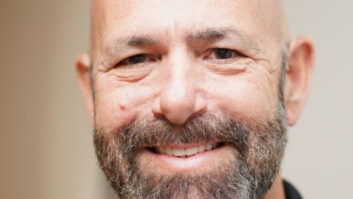The Nationwide Marketing Group seems to be defying market trends in both the consumer electronics and major appliance industries, according to attendees at its summer PrimeTime! convention and its leaders, Ed Kelly, president, and Robert Weisner, executive VP/director.
Leaders of an $11 billion buying group, Kelly and Weisner sat down with TWICE during the convention to discuss Nationwide’s success this year, and pressing issues facing the electronics/appliance industries. Nationwide’s success is reflected in the attendance at PrimeTime!, which was held at the Venetian Hotel, here, from Aug. 19-22. More than 3,700 individual Nationwide members and suppliers attended, with 185 exhibitors taking up 200,000 square feet of exhibit space, an increase of 80,000 square feet from last year’s show.
(See a video of this interview on www.twice.com)
TWICE: How has Nationwide fared this year?
Robert Weisner: In the first six months of the year [major appliance] industry sales were down 5 percent, but Nationwide has been up 1 percent. We have picked up [between] three to six points in market share. In electronics there have been soft spots [for the industry]. But our membership has done well due to the work of our specialty electronics division. Many of our members are involved in installation of flat-screen TVs and home theater. [In HDTV] margins are difficult unless you package the complete sale — accessories and installation — because the Wal-Marts and Costcos of the world have taken margins down.
TWICE: With national chains getting more aggressive and major CE chains like Tweeter, Circuit City and others having their problems, how does it affect your members?
Ed Kelly: Two or three years ago we started to get more of our dealers back into electronics, upgrading their stores and providing a better presentation. [Nationwide members] are holding their own as market intensity has increased. You see a lot of issues with certain brands with service and parts. So we are going with top brand names, top companies, and we see that as a trend. As Robert was saying, you have to merchandise the category correctly and sell the accessories, furniture and installation to generate profits.
Weisner: Most of our members provide service or are affiliated with service companies. We are very concerned about being able to get the quality part to the consumer on time. While some of our members experimented with tier-two products built in China under various names, they have taken another look at it. You might be able to buy a flat panel that’s $400 cheaper, but in six months when you can’t buy a replacement panel or part, you may have to give the customer a TV anyhow. We are urging members to dedicate more of their floors to top brands like Toshiba, Hitachi, LG and Samsung, which provide better service.
TWICE: With all the bad publicity coming out of China recently in regards to unsafe toys, dog food and the like, do you see a backlash against Chinese-based brands?
Weisner: [The publicity] hasn’t helped Chinese products. I’m not saying our members will [not carry] Chinese products … but our members will use any and all ammunition against [Chinese brands] sold at Wal-Mart, Costco and on the Internet, and will tell their customers they would be better served if they bought a first-tier product.
Kelly: I don’t blame [Chinese factories] as much as some suppliers going over there, cutting quick deals and selling fast without setting up a good infrastructure for long-term service and parts. When branded companies go to China they back their reputation on that … and take care of business. I think the big boxes will have some serious problems [with these brands] and it’s coming fast.
TWICE: Nationwide is now an $11 billion organization. What are the challenges of managing a group this size?
Kelly: We are a highly decentralized company and have been very blessed with some phenomenal talent. By having the various divisions responsible for specific territories or businesses, [Nationwide management] can support those divisions by giving them state-of-the-art tools to do their jobs. [Those tools include] advertising, merchandising, sales training, warehousing and other tools to give them the ability to manage their businesses.
Wesiner: Our job is to make sure the division leaders and their people provide members with the tools to compete today and tomorrow. We believe we are gaining share and that we can gain 10 share points [for the group] in the next 36 months. We believe Sears will continue to lose share [in major appliances] and we believe that independent retailers can best serve [those] customers.
TWICE: How does the fourth quarter look this year, and with regard to Black Friday, will we see flat-panel price cuts similar to last year?
Weisner: You will see Black Friday as black as ever because the guys that use Black Friday as an image in the marketplace are not going to move off of it. It has always been Best Buy [focusing on] big deals. They probably do more [Black Friday] advertising than anyone.
What we have been told by suppliers is that Black Friday will be as black as it was last year. That means margins will suffer for that period. There will be 10-, 15- even 20-percent discounts for the fourth quarter. The no-name brands will come out and slash prices. If you’re [a retailer] just selling flat panel and not selling accessories and installation, you will have problems with margins.
Kelly: During the fourth quarter, business will be excellent. The changeover from analog to digital [is coming] and a lot of people are beginning to think, “I’m going to get a new TV. Mine is old. I’m not going to wait.” What the TV industry is going through now we have never seen before. It is so dynamic … the growth level [starting in the fourth quarter] will be phenomenal.
Weisner: We believe that overall innovation in major appliances and consumer electronics will only increase and that our members are looking at at least five great years in sales and profits going forward. The time is now to get their stores ready to reap the rewards and get ready for the tidal wave of sales.
TWICE: Consumers are now more informed than ever before because they research products on the Web. How does that affect your members?
Kelly: Consumers … put pressure on the sales departments [of our members] to be better than in the past. We are providing the tools for our sales department in training, and they also can access kiosks to get the data and information on products that are available. That helps both ways. It shortens the selling time, makes it more focused … and pushes the salesperson to perform better. If [retailers] train their people they win. If they don’t they lose.
Weisner: Consumers come in and want to see a [specific] LG or Samsung [product]. Consumers today have much more knowledge about the products they want to buy, but it doesn’t mean they know what they should buy … That’s why [flat-panel TV] returns [at warehouse clubs] last fall were unbelievable. Suppliers get all that product back and take it on the chin.
TWICE: What’s the role of the PrimeTime! show today and how has your membership changed over the years?
Kelly: Our people today are better business people. In the past five years there have been fewer defaults and today’s independent adapts and changes better [to a changing market]. They are improving their store designs and investing in their businesses more. Independents are far better business people than they were ten or 15 years ago.
Weisner: [At PrimeTime!] our goal is to expose our members to more categories. Their customers need grills, lawn and garden products, and they upgrade their patios and backyards as well as their homes. Consumers go to home improvement stores to buy that stuff, when they could buy it from us.
We don’t want this to be a buying show. We want it to be a merchandising and marketing show. We want members to spend 15 percent of their time with existing vendors and 85 percent with new [categories]… to get more people into their stores.












